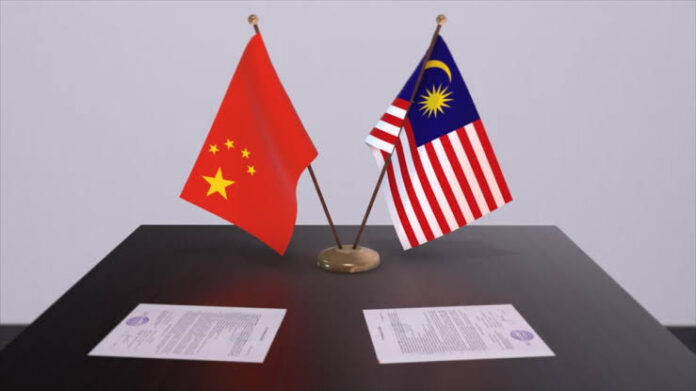Malaysia has been drawn into the ongoing South China Sea dispute after a confidential diplomatic note from China was leaked. This diplomatic note, which was meant to remain private between the two governments, revealed China’s discontent over Malaysia’s activities in the contested waters.
Leaked Diplomatic Note Sparks Malaysia’s Concern
On August 29, a Filipino media outlet exposed the details of the diplomatic note, which had been sent on February 18. The leak has triggered serious concerns within Malaysia’s Foreign Ministry, leading to calls for a police investigation to uncover how such sensitive information became public.
The South China Sea is an area rich in oil and gas reserves, making it a hotly contested region. Several countries, including Malaysia, are vying for control over its valuable resources. However, China has long been claiming nearly the entire region as its own, using a map that includes its so-called “10-dash line” to outline these claims. The leaked diplomatic note from China was a formal demand for Malaysia to halt its exploration of oil and gas reserves near Sarawak, an area Malaysia considers within its own Exclusive Economic Zone (EEZ).
The Malaysian government, while maintaining a strong stance on its territorial claims, has largely avoided public clashes with China. The leak of this diplomatic communication has now put a spotlight on this sensitive issue, causing ripples in diplomatic relations between the two nations. Malaysia, a nation that values its peaceful ties with China, must now face both internal and external pressure over this breach of sensitive information.
Malaysia Inches Closer to China Amid Rising South China Sea Tensions
South China Sea Dispute Heats Up
The South China Sea has been a center of tension for many years, with multiple nations laying claim to its islands and maritime zones. Malaysia, the Philippines, Vietnam, Brunei, and Taiwan all contest China’s aggressive push to claim nearly all of the South China Sea. China’s 10-dash line, a controversial map outlining its claims, cuts through the economic zones of other Southeast Asian countries, sparking numerous disputes. For Malaysia, this latest conflict revolves around the oil-rich waters near Sarawak on Borneo island, specifically in an area close to the Luconia Shoals.
Malaysia’s Bold Stand: Saifuddin Nasution Rejects US Sanctions, Aligns with Iran on Oil Policies
Diplomatic note accused Malaysia of “encroaching” on this contested region, even though it lies within Malaysia’s EEZ, which extends 200 nautical miles from its coastline. Despite the ongoing dispute, Malaysia has continued to explore and develop its oil and gas resources in these waters, contributing to the country’s energy needs and economic growth. However, China’s demand for Malaysia to stop its exploration activities has brought new tension to the table.
What makes this situation particularly alarming for Malaysia is China’s frequent deployment of its coast guard ships to patrol the disputed waters. These ships often sail near Malaysia’s shores, reminding the nation of China’s military presence in the region. However, unlike the Philippines, which has had public confrontations with Chinese ships, Malaysia has chosen a more diplomatic approach, avoiding direct confrontation to protect its economic ties with China, a key trading partner.
Monster Chinese Ship Drops Anchor Near Escoda Shoal in the Philippines: A Looming Maritime Threat
Malaysia’s Response and Diplomatic Strain
In response to the leak of the diplomatic note, Malaysia’s Foreign Ministry has expressed serious concern, describing the situation as a breach of confidential communication between the two nations. Malaysia has stressed that such a leak of the diplomatic note undermines the official channels used for peaceful dialogue and resolution of disputes. The Foreign Ministry has initiated both an internal investigation and a police probe to determine how the classified diplomatic note was leaked to the media in Philippines. This is a significant step, as Malaysia tries to manage the potential fallout from this breach of trust between the two nations.
Despite the growing tension over the South China Sea, Malaysia and China have maintained their commitment to peaceful settlements. In their official statements, both nations emphasize the importance of resolving the dispute without resorting to violence or conflict. Last month, the two countries took on co-chairmanship of the Association of Southeast Asian Nations (ASEAN) for a three-year period, further solidifying their cooperation in regional matters.
China’s Lingshui 36-1 Discovery in South China Sea Triggers Major Regional Tensions
China’s influence in Malaysia extends beyond territorial disputes, with strong economic ties between the two nations playing a significant role in how these issues are handled. Since 2009, China has been Malaysia’s largest trading partner, and both countries rely on one another for trade, investment, and infrastructure projects. This economic relationship means that Malaysia is often cautious when addressing sensitive issues like the South China Sea dispute, as public confrontation could strain this valuable partnership.
In the face of these challenges, Malaysia must now navigate the complicated waters of diplomacy, ensuring that its territorial rights are protected while maintaining a stable relationship with China. The leaked diplomatic note has shone a light on the delicate balance Malaysia tries to maintain in its foreign policy—protecting its national interests while avoiding direct conflict with one of the world’s largest powers.
This recent development also highlights the wider regional tensions over the South China Sea, with countries like Vietnam, the Philippines, and Malaysia all facing pressure from China over their respective claims. Unlike its neighbors, Malaysia has often opted for a quieter, less confrontational approach, hoping that diplomacy will lead to a peaceful resolution.
However, the leak of this confidential note has brought Malaysia’s dispute with China into the public eye, forcing the government to take a stronger stance on the issue. While both nations continue to advocate for peaceful discussions, the situation remains fragile, with the potential for further conflict if the territorial disputes are not resolved amicably.
In the end, Malaysia’s ability to manage this crisis will depend on its diplomatic skills and its efforts to protect its national interests in the face of increasing pressure from China.


